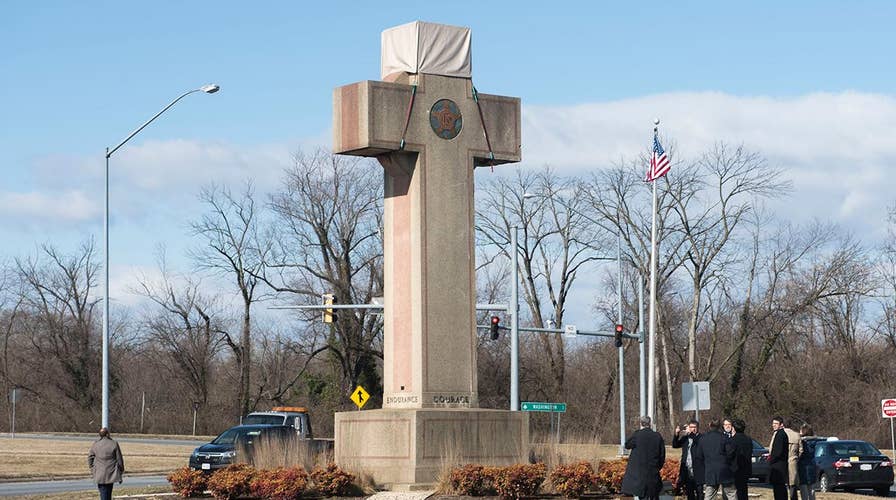Veterans fight to keep WWI 'Peace Cross' memorial on public land
Supreme Court debates war memorial; 'Fox News @ Night' host Shannon Bream has the details.
This Memorial Day, as they have since 1925, the members of The American Legion in Bladensburg, Maryland, will gather before the Bladensburg WWI Veterans Memorial to lead the community in a moment of remembrance. If you happen upon it, stop and watch. Depending on how the U.S. Supreme Court rules in The American Legion v. American Humanist Association, it may be the last service of its kind. And not just in Bladensburg, but across the country.
Also known as the “Peace Cross,” the memorial looks like the cross-shaped headstones guarding the graves in Europe of fallen Americans from WWI. The legal culprit that signals doom for veterans memorials that invoke religious imagery is what some call “the Lemon test.”
CRITICS BLAST 'P IS FOR PALESTINE' CHILDREN'S BOOK AS ANTI-SEMITIC; LIBRARY POSTPONES AUTHOR EVENT
Named for the 1971 case of Lemon v. Kurtzman, the “Lemon test” asks a number of subjective questions gauging the purpose, effect, and potential endorsement of religion of a particular state action. The problem is that the test has led to absurd and even hostile results.
At oral argument earlier this year, Justice Neil Gorsuch made a merciful suggestion, that it may be time “to thank ‘Lemon’ for its services and send it on its way.” After all, for most of the republic’s history, we did not have—or need—Lemon. The Establishment Clause by itself worked just fine.
Yet, it is not just the uncertainty such a cumbersome standard allows that poses a problem. It is that those who appear eager to purge the public square of specific religious symbolism are also most eager to keep Lemon in place. Their agenda benefits from the confusion and disarray.
Teachers have grown afraid to allow candy canes in the classroom at Christmas, fearing peppermint flavored sugar will lead to legal liability.
The purpose of the Establishment Clause had been to prevent the government from coercing the religious belief or behavior of its citizens. Passive memorials, like the Bladensburg WWI Veterans Memorial under consideration in The American Legion v. AHA, does nothing to coerce anyone to do or believe anything. It merely stands there in witness of the service and sacrifice of 49 men who died defending freedom. Lemon changed all that; it weaponized offense.
Justice Gorsuch noted from the bench, Lemon is anomalous in the law, permitting lawsuits on the basis of offense. “We accept that people have to sometimes live in a world in which other people's speech offend them,” Justice Gorsuch observed. “We have to tolerate one another.”
Ironically, at the moment Justice Gorsuch posed those words to counsel inside the court, one activist outside railed that the Bladensburg WWI Veterans Memorial—also called the “Peace Cross”—gives veterans the “middle finger” and is a “gang symbol” of Christianity. So much for tolerance. They demand their offense be assuaged at the cost of tearing down a memorial that one mother called her son’s “gravestone.”
The Founding Fathers never meant for the Establishment Clause to unleash a religious cleansing upon the country.
Lemon and its legal progeny have also left Americans baffled, frustrated, and confused over the absurd results—most often carried out under the banner of the apocryphal “separation of church and state.” In other words, if the decisions have not permitted outright religious hostility, the results have been absurd. For instance, teachers have grown afraid to allow candy canes in the classroom at Christmas, fearing peppermint flavored sugar will lead to legal liability. Transit authorities refuse to permit the purchase of ad space on city buses by a church that features shepherds, sheep, and stars, believing the ads would “establish a religion.”
And, on town squares, city leaders often have to gauge whether they have enough reindeer and nutcrackers near enough to the nativity scene on the town square to sufficiently secularize a Christmas . . .er, holiday display or face the wrath of Lemon.
Reasonable Americans who can easily read and understand the text of the First Amendment for themselves deserve better than this judge-imposed silliness.
The Founders drafted the two clauses of the First Amendment in order to prevent government from establishing an official church of the United States or interfering with how citizens live according to the faith of their choice. Unless the state coerces someone into a religious belief or exercise or enacts laws or policies that purport to actually establish an official religion, there can be no violation of the Establishment Clause of the First Amendment.
CLICK HERE TO GET THE FOX NEWS APP
Such a reasonable clarification by the Court would end these repeated attempts to unleash bulldozers and sandblasters against religious symbols in public places across the country.
The Founding Fathers never meant for the Establishment Clause to unleash a religious cleansing upon the country. Our hope is that the Justices of the U.S. Supreme Court will put an end to these seek-and-destroy missions, protecting this Memorial Day’s observance and those yet to come.

